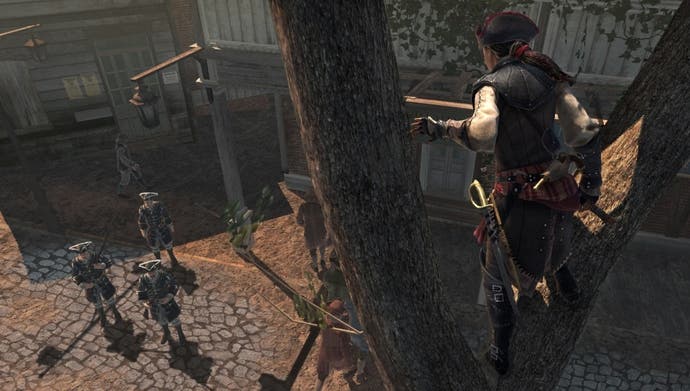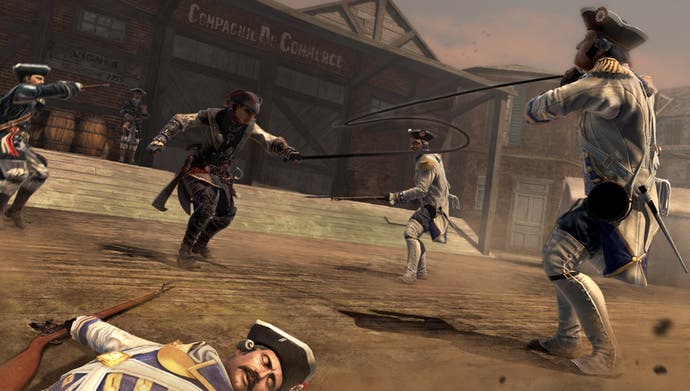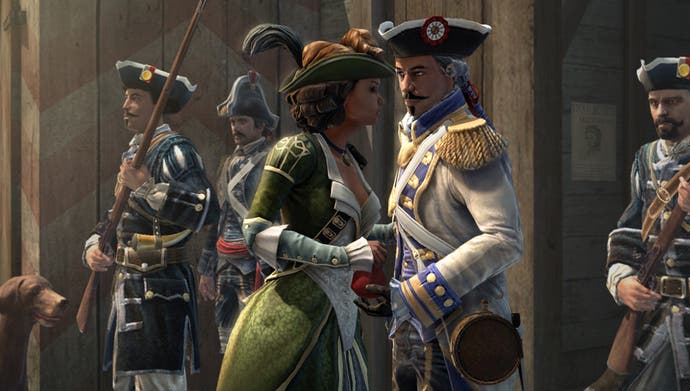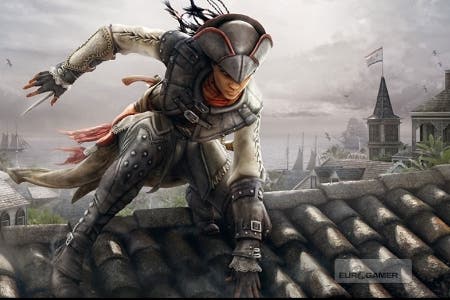Assassin's Creed 3: Liberation review
Vita la revolution?
PlayStation Vita developers, like PlayStation Portable developers before them, always sound very happy when they're put to work on the handheld version of a famous console game. They love the heritage and the rich potential afforded by a blank slate, they say. It's a fantastic opportunity anyone would relish. Thanks to the fans, etc.
In private, however, I imagine they all cry themselves to sleep. They're damned if they do and damned if they don't. If they try to recreate the full experience of whatever is being made for the home console then they won't manage it, because even the mighty PlayStation Vita can't do what the PlayStation 3 can do in the right hands. And trying to do something different is no better, because any spin-off they produce inevitably won't live up to its more handsome and expansive relative. Plus, it will probably be released on exactly the same date, meaning that it sells a fraction of the copies it might do in clear air.
Assassin's Creed 3: Liberation has the whiff of spin-off about it, for sure. It's set in the same era, but uses different locations, characters and ideas on a necessarily smaller scale than the unbelievably vast Assassin's Creed 3. Playing it unlocks some stuff in the PS3 version and vice versa, but nothing amazing. So what are we left with? More tears before bedtime?

Whereas Assassin's Creed 3 continues the home series' shift away from stealth towards action, Liberation is a covert assassination game first and foremost, which is a good start. Set in New Orleans, the Louisiana Bayou and occasionally beyond, it's about master assassin Aveline de Grampré's journey through trees and rooftops to disrupt the slave trade and unmask the sinister individuals pulling the strings that drive it. While in many respects it's the now-standard mishmash of open-world missions to gather intelligence followed by a hit, you spend a lot more time out of sight than elsewhere in the series' recent history.
"Whereas Assassin's Creed 3 continues the home series' shift away from stealth towards action, Liberation is a covert assassination game first and foremost."
For example, you may have to sow fear and discontent among Spanish troops patrolling the Bayou, which you do by shadowing them from the treetops, waiting for them to happen upon scary voodoo totems, and then quietly poisoning one of them with a blowpipe so their comrades think they've been cursed. Or maybe you need to take out a slave trader in a nearby barracks, which you do by sneaking between haystacks whispering words of incitement in local slaves' ears until they riot, freeing you up to pick off your target.
The main mechanics of the series translate effortlessly to the Vita screen and controls. If anything, Aveline moves more freely than Connor or Ezio, flying up the sides of buildings and over ledges and mantles with a welcome fluency, and a couple of touch-control additions - for accessing the mini-map and weapon-swapping - fold neatly into your patterns of play rather than impeding them. The difficulty of fulfilling side objectives seems a little lower than AC3, too, meaning that the pleasure of artful stealth and the elusive "full synchronisation" comes a little more easily. A lot of the time, whether you're stalking a target or climbing to a viewpoint, Liberation's a satisfying game to play.

It does have issues though, many of which are inherited. Assassin's Creed once felt like a series that would one day give you an envelope full of names and then expect you to figure out the rest, but nowadays it won't even hand you an envelope without giving you a tutorial on how to open it. That's as true on Vita as it is on any other system - and if anything the envelope tutorial, which is a real thing, is an awful nadir. And while Aveline is a little more engaging than AC3's Connor Kenway, she's still no Ezio Auditore, and the surrounding cast struggle to offer anything to latch onto either.
Vita isn't quite up to the ambition of the world design, either, struggling with frame-rate drops from the first scene onwards, while the incursion of Vita-specific controls I mentioned earlier is more frequently annoying than welcome. Having to hold the Vita camera up to a light source and then jiggle it about to the identify secret message in a letter isn't fun when you're told exactly how to do it, and based on this ropey implementation it probably wouldn't be fun even if you did discover the solution yourself. As for the vaunted touch-screen combat additions, they are fine, but what's the point when you can still win virtually every fight in the game with good old block-and-counter?
New Orleans and the Bayou aren't as rich with distractions as their contemporaries either, although what is provided is generally entertaining and they are genuine open-world environments. In the city, Aveline can build up a fleet of trade ships and send them off to various destinations to buy and sell cargo to accumulate funds, which she can then spend buying up tailors, dressing booths and weapon makers, and she can also assassinate unscrupulous business rivals. And while the Bayou feels like a slightly missed opportunity - hopping through the treetops is great fun and isn't exploited a huge amount - there are at least a good number of main story missions that take advantage of it, which isn't as true in the otherwise-awesome Frontier in AC3.

One genuinely limp addition to Liberation is the way Aveline can swap outfits - or 'personas' in the game's parlance - in the aforementioned dressing stations. Dressed as a slave, she can blend into crowds of the same, pretending to sweep floors or saw wood, while both slave and assassin personas give her access to the rooftops. The 'lady' persona, meanwhile, cuts her movement speed down and keeps her feet on the ground, but allows her to move through more dangerous areas and kill even more quietly.
It sounds quite good in theory, allowing you to swap outfits to evade detection and use one persona to reduce the notoriety of the others, but the dressing stations are seldom around when you need them and the game is a bit awkward about when you can change clothes and what you can do. Being told you can't switch to slave or assassin one minute and then heading to the objective marker only to be told "The Bayou is no place for a Lady" is annoying enough that the whole idea falls down on the spot. I'd rather just be an assassin.
Fortunately, the game is on your side of that argument most of the time too, and that's what makes Liberation mostly worthwhile. It isn't as good at the core Assassin's Creed loop of picking an icon on the map and then getting diverted by entertaining side content on the way there, but where it does make a play for your attention it generally does so by asking you to, you know, be an assassin, creeping up on people and taking them down without them or anyone else noticing. That's fun. When it does that, Liberation lives up to its name and feels like a worthy spin-off, although - as with so many of these portable endeavours - one still can't help conclude that it's going to be forgotten within weeks.









